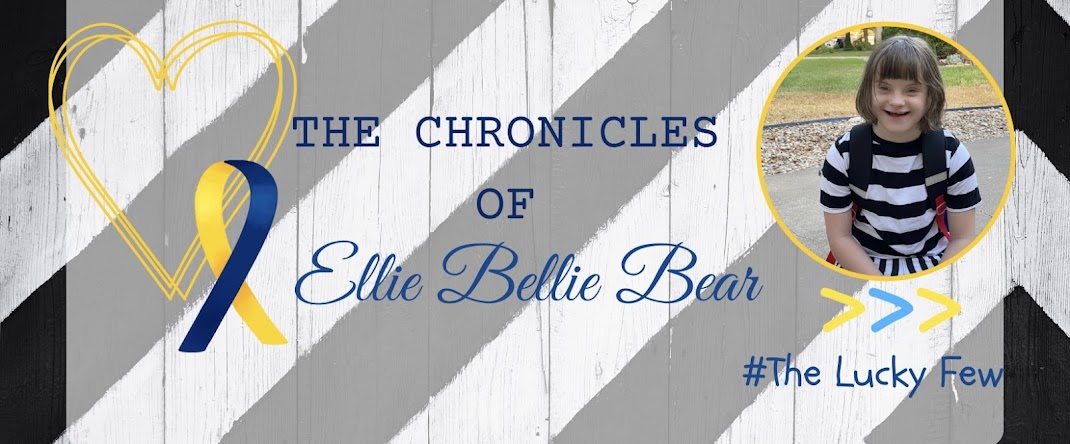No fear, I will end this post with tons of Ellie Bear pics. . .to show that we are all more alike than different.
Down syndrome is genetic disorder characterized by the possession of 3 copies of the 21st chromosome.
What does that mean?
Genetic means a mutation of the genes. Everyone has genes. Twenty-three chromosomes from mom and 23 from dad. This equals 46 chromosomes total. There are three types of Down syndrome and the most common form of Ds (Ellie's form) results in an extra chromosome. This means my daughter has 47 chromosomes rather than the traditional 46 chromosomes. Ellie has Trisomy 21. Tri = 3. Therefore she has 3 copies of the 21 chromosome.
Down syndrome is not contagious nor can you remove the extra chromosome. That extra gene material is there for life and it starts in-utero. It is NOT ANY ONE'S FAULT. It just happen spontaneously and it happens BEFORE the child is born. That means she didn't "catch it" after birth or anything along those lines.
A side note on the hereditary part--hereditary means the syndrome is passed down from one family member to the next. Genetic means there is a change in the genetic material (chromosomes). Down syndrome for the most part is genetic and NOT hereditary. My aunt on my father's side as Trisomy 21 aka Down syndrome. It is just pure coincidence that my daughter has Ds. Coincidence. I was at no higher risk of having a child with Ds than the general population for women under 30 years-old.
However, there is one subset or type of Ds that is hereditary and that is Translocation Ds. Listed below are the 3 types of Ds.
1. Trisomy 21: This form makes up 95% of DS cases. This is where every single cell has 47 chromosomes with the extra being #21. Trisomy 21 occurs at conception (3). While most of the time it is the egg that might contribute the extra chromosome, it can be the sperm (3). I like to think that Ellie is 51% me and 49% Andrew. That being said, when she is naughty, I might claim she is more Andrew than me.
 |
| Three full copies of the 21st chromosome |
2. Translocation: This is where a piece of the 21st chromosome breaks off and attaches itself to another chromosome. This is the type of Ds that is thought to be hereditary--as in it can be passed down generation to generation.
 |
| This is actually a picture of Translocation 22. Just imagine that the 21st chromosome is the translocation. |
3. Mosaicsim: This is where some of the cells have 46 chromosomes while others have 47 chromosomes with the 47th being #21. This type is thought to make up 1-2 % cases of Ds.
How is Down syndrome diagnosed?
It is requires the blood of your newborn baby. Down syndrome is typically suspected either after a prenatal blood test or ultrasound OR just shortly after birth (like Ellie). A sample of blood is taken from the baby and shipped off to a fancy schmancy lab were a karotype is performed. Here is Ellie's:
 |
| I wish Ellie's karotype was in color. Instead, we must settle for the boring black and white photocopied version. |
 |
| Giddy Up! |
 |
| Preparing for her perfect 10 decent down the slide. |
 |
| Yippee! Wee! |
 |
| She really looks like me here--She is practicing her Axel Rose voice. |
 |
| Ta-Ta. Ellie has some important exploring. Actually she wants to go down the big slide and mama bear is preparing for a heart attack. |



Thank you professor Anna! Just kidding! Great post.
ReplyDeleteLove the pics!!!
Hey, Anna! I may be misreading your meaning, but I think you may have incorrectly indicated that mosaic DS is hereditary - it is actually translocation DS that is (sometimes, but not always) hereditary.
ReplyDeleteFWIW - Nathan has mosaic Down syndrome.
Thanks Andi! Good catch. I did switch Mosaic and Translocation. I went back and corrected it and will be much more careful when posting. Thank you again.
ReplyDeleteI always like to point out that the amount of genetic material on the y chromosome that is missing to be an x chromosome is about the same as that on one of the 21st chromosomes, so the average woman with only 46 chromosomes is just about as different as one with Ds as she is to a man without.
ReplyDelete